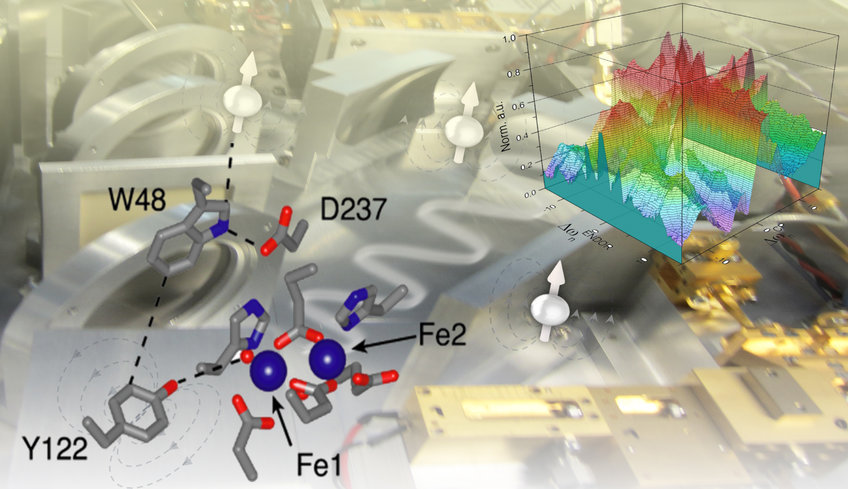Electron-Spin Resonance Spectroscopy
The research group is dedicated to modern electron-spin resonance (ESR/EPR) spectroscopy, from high-frequency EPR to methods at the interface with nuclear magnetic resonance (NMR) and their applications in biological science. We have been investigating how to excite and detect paramagnetic centers and their coupled nuclear spins with microwave (mw) and radio frequency (rf) pulses to achieve information on active sites of proteins or on the global structure of biomolecules. One main strategy is to transfer the much larger polarization of electron spins to nuclear spins. To this end, developments of pulse schemes at high magnetic fields (≥ 3 Tesla) and corresponding resonant mw frequencies are in focus. The most representative applications are the investigation of enzymatic reactions involving paramagnetic intermediates, particularly the proton-coupled electron transfer (PCET) in E. coli ribonucleotide reductase (RNR), and the exploration of long-range structural information in nucleic acids and transmembrane peptides by pulsed dipolar spectroscopy.
Press releases & research news
The International Society of Magnetic Resonance (ISMAR), is an international network for researchers using and developing magnetic resonance technologies. ISMAR awards its fellowships to particularly committed scientists who not only stand out for their outstanding research, but also promote the exchange of ideas within the network.
more
The research group leader receives 2.4 million euros of funding from the European Research Council for the next five years. The physical chemist and her team want to use the money to combine two methods: nuclear magnetic resonance spectroscopy and electron spin resonance spectroscopy.
more
This year's Bruker Prize of the Electron Spin Resonance (ESR) Spectroscopy Group of the British Royal Society of Chemistry is awarded to Marina Bennati of the MPI for Biophysical Chemistry. The group honors the physico-chemist for her outstanding work in ESR spectroscopy. (in German)
more
Show more
Electron spins as probes for biomolecules
Unpaired electrons possess a magnetic moment, which is about three orders of magnitude larger than the one of a proton. This moment can be employed as a highly sensitive probe in EPR spectroscopic investigations to gain structural information at the atomic up to the nanometer scale. The experiments provide insights into structural changes of biomolecules during their functional states. We have developed and implemented multi-frequency EPR methodologies to investigate enzymatic reactions in proteins and oligonucleotides.
(in German)
more

